


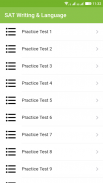
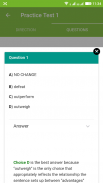
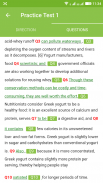
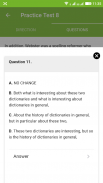
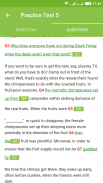

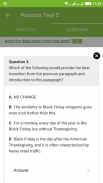

SAT Test Writing & Language

Description of SAT Test Writing & Language
SAT Test Writing & Language app provide free model practice tests covered all types of Writing and Language Section problems preparation with solution.
How Is SAT Writing and Language test Structured?
As you saw above, though, it’s different than the SAT Writing section of past years, so make sure you don’t confuse the old and new SAT Writing sections as exact equivalents.
SAT Writing will be your second section on the SAT, right after Reading and a five-minute break. After you’ve stretched and snacked, you’ll get to work on Writing, which asks you 44 questions in 35 minutes. You’ll have about 47 to 48 seconds to answer each question.
All of the Writing questions are multiple choice and feature four answer choices, A, B, C, and D. As you read above, every single question on SAT Writing is passage-based. Some questions may be detail-oriented, even asking you about a single word, but they’ll still point to that detail within the context of a longer passage.
Within the Writing section, you’ll get four passages of about four to five paragraphs, or 400 to 450 words, each. Every passage will accompany 11 questions.
Don’t worry about having to flip back and forth through the test booklet to find your answer. The questions will be lined up alongside the paragraphs to which they refer. Here’s a preview of the format (this passage continues from a previous page)
SAT Test Writing & Language Quick Facts
All questions are multiple choice and based on passages.
Some passages are accompanied by informational graphics, such as tables, graphs, and charts — but no math is required.
Prior topic knowledge is never tested.
The Writing and Language Test is part of the Evidence-Based Reading and Writing section.
What the Writing and Language Test Is Like
To answer some questions, you’ll need to look closely at a single sentence. Others require reading the entire piece and interpreting a graphic. For instance, you might be asked to choose a sentence that corrects a misinterpretation of a scientific chart or that better explains the importance of the data.
What the Writing and Language Test Measures
1] Command of Evidence
Questions that test command of evidence ask you to improve the way passages develop information and ideas. For instance, you might choose an answer that sharpens an argumentative claim or adds a relevant supporting detail.
2] Words in Context
Some questions ask you to improve word choice. You’ll need to choose the best words to use based on the text surrounding them. Your goal will be to make a passage more precise or concise, or to improve syntax, style, or tone.
Analysis in History/Social Studies and in Science
You’ll be asked to read passages about topics in history, social studies, and science with a critical eye and make editorial decisions that improve them.
3] Expression of Ideas
Some questions ask about a passage’s organization and its impact. For instance, you will be asked which words or structural changes improve how well it makes its point and how well its sentences and paragraphs work together.
4] Standard English Conventions
This is about the building blocks of writing: sentence structure, usage, and punctuation. You’ll be asked to change words, clauses, sentences, and punctuation. Some topics covered include verb tense, parallel construction, subject-verb agreement, and comma use.
What Are the SAT Writing Passages Like?
Careers - passage might feature trends or debates in major fields, like business, technology, or health care.
Social studies - passage might draw from history, anthropology, psychology, political science, sociology, among other areas.
Humanities - this passage might focus on arts and literature, feature an author, or describe trends in prose, poetry, art, music, or dance.
Science - this passage will explore topics in earth science, biology, chemistry, or physics.


























